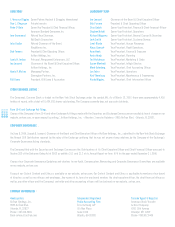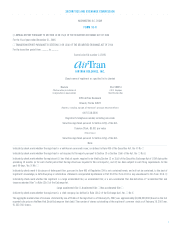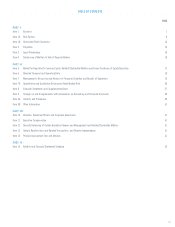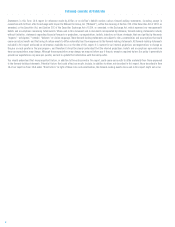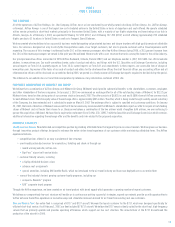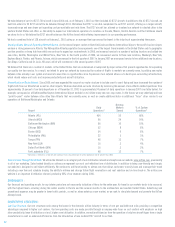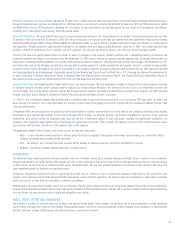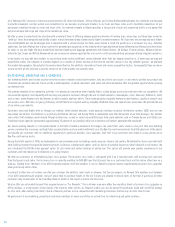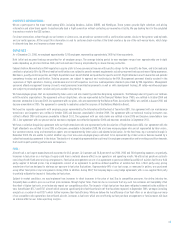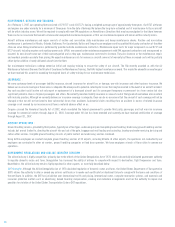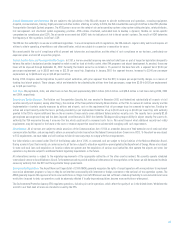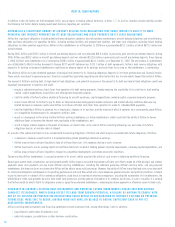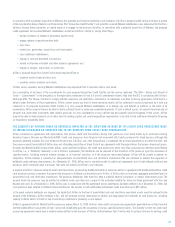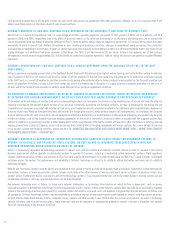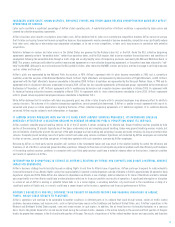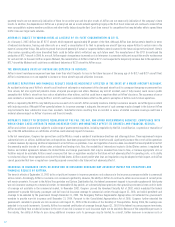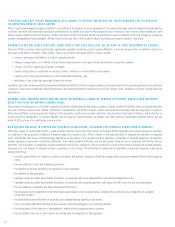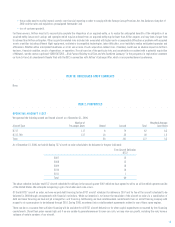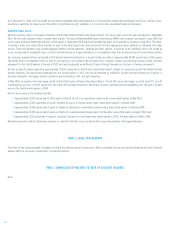Airtran 2006 Annual Report Download - page 12
Download and view the complete annual report
Please find page 12 of the 2006 Airtran annual report below. You can navigate through the pages in the report by either clicking on the pages listed below, or by using the keyword search tool below to find specific information within the annual report.
MAINTENANCE, REPAIRS AND TRAINING :
As of February 1, 2007, our operating fleet consisted of 87 B717’s and 41 B737’s having a weighted-average age of approximately three years. Our B737 airframes
and engines are under warranty for a minimum of three years from the date of delivery. We believe the long-term estimated cost of maintenance to fly our aircraft
will be within industry norms. We will be required to comply with new FAA regulations or Airworthiness Directives that may be promulgated in the future however;
there can be no assurance that we will not encounter unexpected maintenance expenses or that our maintenance expense will remain within industry norms.
Aircraft airframe maintenance and repair consists of routine and non-routine daily maintenance and heavy maintenance checks. Routine and non-routine
maintenance is performed in Atlanta, Orlando, Baltimore, Fort Lauderdale, Dallas and Tampa by our employees and by qualified third party contractors at the other
cities we serve. Heavy maintenance is performed by qualified outside maintenance contractors. Maintenance repair costs for major components on our B717 and
B737 aircraft, including engines and auxiliary power units (APUs) are covered under maintenance agreements with FAA approved contractors and are expensed as
incurred. As new aircraft come out of their warranty period and as they age, maintenance costs tend to increase. They also increase as the maintenance, repair,
and overhaul providers escalate their pricing. We expect maintenance costs to increase as aircraft come out of warranty but these increased costs will be partially
offset by the addition of newly delivered aircraft into the fleet.
Our maintenance technicians undergo extensive initial and ongoing training to ensure the safety of our aircraft. The FAA recently awarded us with the Air
Maintenance Technical Diamond Certificate of Excellence for Maintenance Training, the FAA’s highest maintenance award. This marks the eleventh consecutive year
we have received this award for exceeding the required levels of safety training for our maintenance technicians.
INSURANCE :
We carry customary levels of passenger liability insurance, aircraft insurance for aircraft loss or damage, war-risk insurance and other business insurance. We
believe our insurance coverage in these areas is adequate. We are exposed to potential catastrophic losses that may be incurred in the event of an aircraft accident.
Any such accident could involve not only repair or replacement of a damaged aircraft and its consequent temporary or permanent loss from service but also
significant potential claims of injured passengers and others. We currently maintain liability insurance in amounts and of the type which we believe are consistent
with industry practice. Although we currently believe our insurance coverage is adequate, there can be no assurance that the amount of such coverage will not be
changed or that we will not be forced to bear substantial losses from accidents. Substantial claims resulting from an accident in excess of related insurance
coverage or not covered by our insurance could have a material adverse effect on us.
Congress passed the Homeland Security Act of 2002, which mandated the federal government to provide third party, passenger, and hull war-risk insurance
coverage to commercial carriers through August 31, 2003. Coverage under this Act has been extended and currently we have received certification of coverage
through August 31, 2007.
AIRPORT OPERATIONS :
Ground handling services, provided by third parties, typically are of two types: under-wing only and complete ground handling. Under-wing ground handling services
include, but are not limited to, directing the aircraft into and out of the gate, baggage and mail loading and unloading, lavatory and water servicing, de-icing and
certain other services. Complete ground handling consists of public contact and under-wing services combined.
Using AirTran employees we conduct complete ground handling services at 33 airports, including Atlanta. At other airports, the operations not conducted by our
employees are contracted to other air carriers, ground handling companies or fixed base operators. We have employees at each of these cities to oversee our
operations.
GOVERNMENT REGULATIONS AND AIRLINE INDUSTRY TAXATION :
The airline industry is highly competitive, primarily due to the effects of the Airline Deregulation Act of 1978, which substantially eliminated government authority
to regulate domestic routes and fares. Deregulation has increased the ability of airlines to compete with respect to destination, flight frequencies and fares.
Nevertheless, the airline industry remains highly regulated in other aspects, as more fully described below.
DOT Oversight.
Although the Airline Deregulation Act of 1978 abolished regulation of domestic routes and fares, the United States Department of Transportation
(DOT) retains the authority to alter or amend any airline’s certificate or to revoke such certificate for intentional failure to comply with the terms and conditions of
the certificate. In addition, the DOT has jurisdiction over international tariffs and pricing, international routes, computer reservation systems, and economic and
consumer protection matters such as advertising, denied boarding compensation, smoking and codeshare arrangements and has the authority to impose civil
penalties for violation of the United States Transportation Code or DOT regulations.
06


